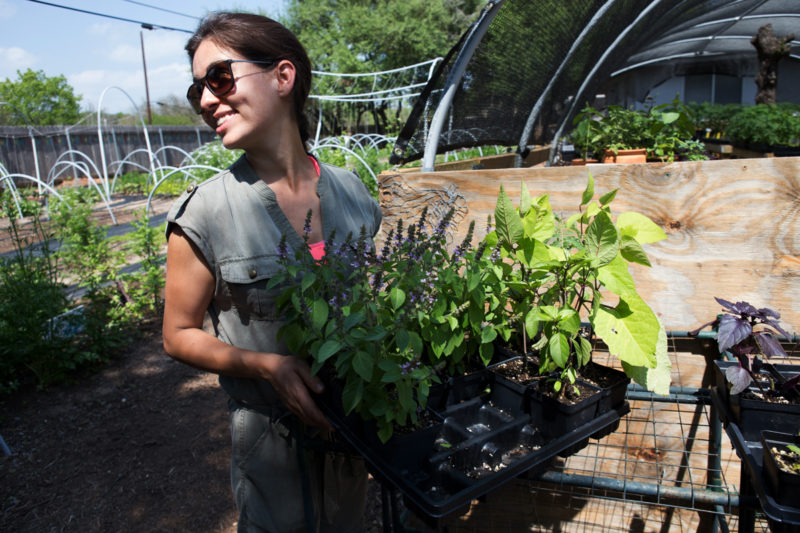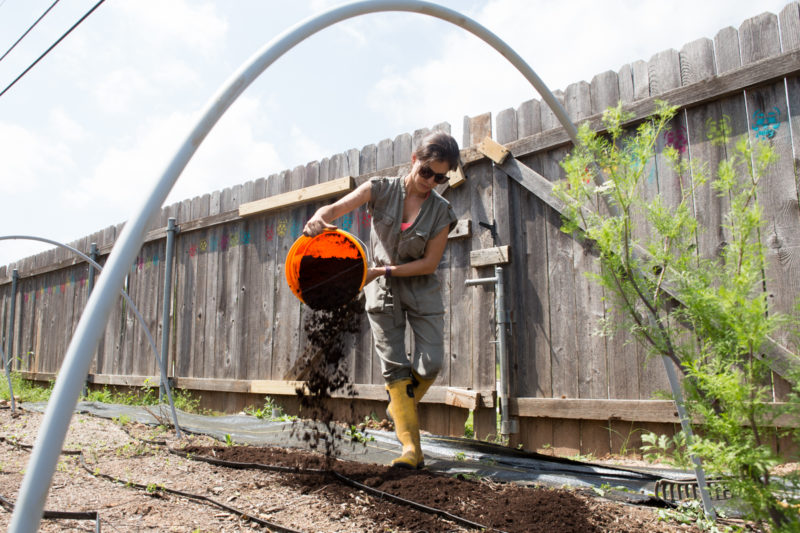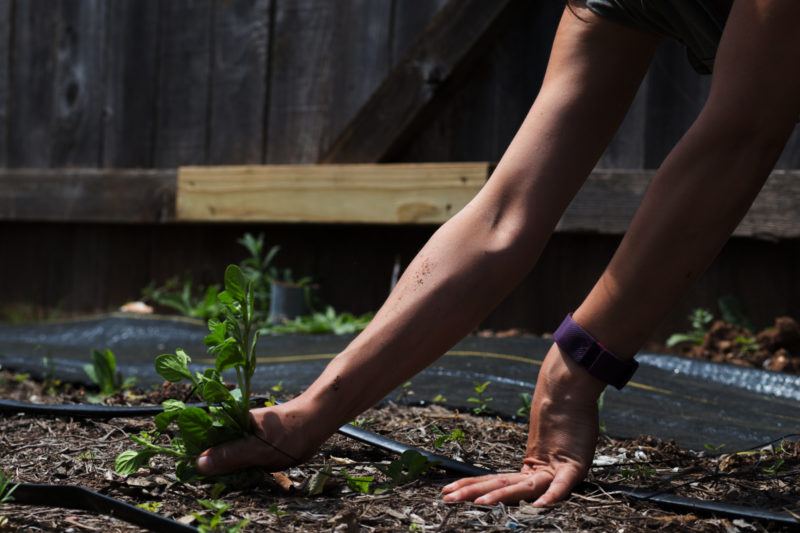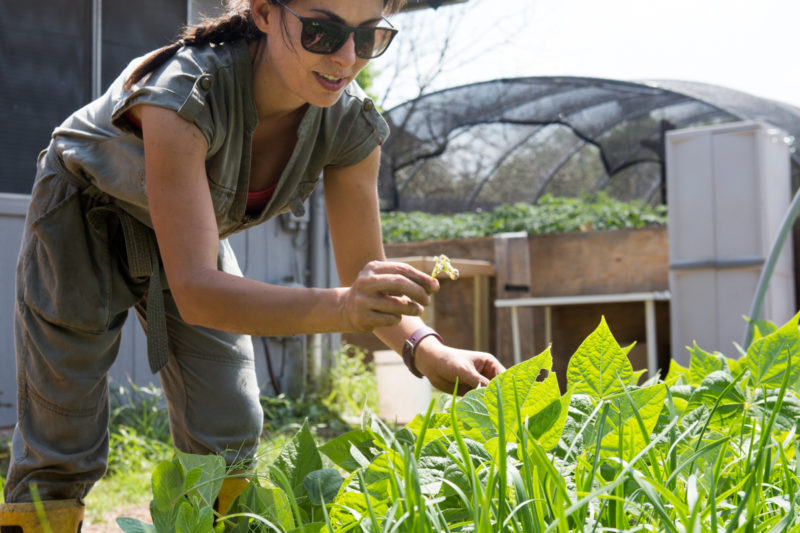A Former Corporate Banker Plants New Roots in Urban Farming
By Molly Smith
Photography By Lynda Gonzalez
Reporting Texas

Alejandra Rodriguez Boughton carries seedlings that are ready to transplant. She founded La Flaca, an organic urban farm that grows rare produce for local needs. “Most people that live in cities don’t know a farmer, so people are always shocked when I tell them what I do for a living,” she said. Lynda Gonzalez/Reporting Texas
Like many graduates of MBA programs, Alejandra Rodriguez Boughton starts her day around 6 a.m. But she isn’t up early to check the financial headlines. Instead, the day’s weather is her primary concern.
Rodriguez Boughton’s office is a small two-bedroom house on a quiet cul-de-sac in Southwest Austin. There’s little shade or cover in the yard where she spends most of her work day, converting what once was grass into farmland.
Raised beds line the side of the house, where she has planted radishes, beets, peppers and bananas. Planters behind the house contain edible flowers, micro-greens and a wide array of herbs, including seven types of mint and 22 varieties of basil, one of which tastes like bubblegum. A large greenhouse contains seedlings to transfer to the yard, and racks of plants fill the garage.
On a half-acre, she’s managed to grow 195 types of herbs, edible flowers and vegetables, whose seeds originated from across the globe. There’s even a beehive and hens on the property.

Rodriguez Boughton pours a layer of topsoil to prepare a new area for seedlings. Lynda Gonzalez/Reporting Texas
When Rodriguez Boughton, 33, moved to Austin in 2012 from her native Monterrey, Mexico, to attend the University of Texas at Austin’s McCombs School of Business, she didn’t envision adding the title of farmer to a resume that includes nearly six years in corporate banking. But in July 2014, she founded La Flaca and has since worked to grow the business into a profitable urban farm.
She moves around the farm with an ease and quiet confidence that belie her relative inexperience. She’s been farming only for a couple of years.
“Most people that live in cities don’t know a farmer, so people are always shocked when I tell them what I do for a living,” she said.
She doesn’t fit the traditional image of a Texas farmer. For starters, she’s nearly half the average age of farmers in the state. She’s also a woman and Latina.
Rodriguez Boughton is part of a growing number of women turning to agriculture. Today, 30 percent of U.S. farmers are women, according to the U.S. Department of Agriculture, up from 21 percent in 2007. Some, like her, are embracing it as a second career.
Her first inkling of a future career change came when she received a promotion at Banorte, one of Mexico’s largest private banks. “I realized I didn’t want my boss’ job or my boss’ boss’ job,” she said. Yet she pursued an MBA anyway, hoping that it would reinvigorate her interest in the financial world.
It was during the final weeks of the program when Rodriguez Boughton was in the midst of final-round interviews with Microsoft and other companies in Austin that she realized her definition of success had changed. “I was not looking to work hard and get money as I was in my 20s,” she said. “I wanted a purpose.”
In times of stress, Rodriguez Boughton found herself in the kitchen and she sought comfort in recreating her favorite dishes, toying with the idea of starting a business around cooking high-end Mexican cuisine. But she couldn’t find the chilhuacle peppers she needed to make Oaxacan mole tamales. She started growing the peppers, rarely found outside of Mexico, on her apartment balcony.
“One day in the shower it just struck me: what if I started growing rare produce to address local sourcing needs?” she said.
Given that she had no background in farming, she started going to agriculture conferences and took online and community college classes to learn everything she could about sustainable, small-scale farming. She also hired her first and only employee, Ben Carroll, who studied horticulture in college and moved from Connecticut to join La Flaca after meeting Rodriguez Boughton through a mutual friend.

Rodriguez Boughton pulls weeds on her farm, where she grows rare produce for local customers. Lynda Gonzalez/Reporting Texas
Her business background, paired with Texas’ year-round growing season, attracted Carroll, 25, to the position. “Farms fail because farmers have no business experience,” he said. “Farmers need to think like bankers.”
La Flaca sources produce, including chilhuacles, to seven Austin restaurants, including Olamaie, L’Oca D’Oro and Mattie’s at Green Pastures. It also sells produces to its neighbors in the cul-de-sac.
Unlike Rodriguez Boughton, most women aren’t the principal operators of Texas farms – they run 15 percent of farms in the state, one point above the national average, according to the 2012 USDA Agriculture Census, the agency’s most recent survey. Nationwide, women only own 7 percent of farmland.
Nine percent of farms in Texas have operators who identify as Hispanic or Latino, which is slightly higher than the national average of 3 percent.
“To become a farmer is a capital-intensive business and like any other business it takes money to make money,” said Robert Maggiani, a sustainable agriculture specialist at the National Center for Appropriate Technology Southwest Regional Office in San Antonio. “If you don’t have collateral and assets and you can’t borrow money, then you can’t really get into land unless you inherit it.”
Maggiani said that many Latinos also associate farming with poverty because that’s the way their families have experienced agriculture for the last half-century. “It’s not something that’s been promoted” in younger generations, he said.
Rodriguez Boughton decided to embrace small-scale agriculture because she wanted to remain in Austin, where the cost of land is on the rise. “Millennials aren’t moving to the country,” she said.
She relied on savings from her previous career to reduce the financial risk of jumping into an industry in which she had no experience. She purchased a small home in Austin’s Maple Run subdivision and rents out the rooms to cover the farm’s cost. A $5,000 grant from UnLtd USA and another in the same amount from the Austin Food & Wine Alliance have helped offset costs.
“Agriculture is a business that takes time to be self-sustainable,” she said, adding that she hopes to break even by the end of this year.
La Flaca translates to “the skinny woman,” and it’s also one of the names given to the Grim Reaper. Rodriguez Boughton chose a sugar skull, a calavera, for her logo to represent Mexican culture and reflect the farm’s young, urban feel.
“One of my favorite things of Mexican culture is how we make fun of our fears,” she said. “The biggest fear I’ve faced so far in my life was quitting a stable, profitable career to leap into the great unknown. So that logo and that name is a constant reminder to shake off my fears and keep moving forward.”
Her three goals for the end of the year are to grow more, get more people in the community growing and avoid bankruptcy. She’s working to recruit the farm’s neighbors to turn their own yards into gardens and to expand the city’s community of first-time, urban farmers. In five years’ time, she hopes to have transformed five acres of urban soil into productive farmland.
Edwin Marty, the food policy manager for the City of Austin, hopes that La Flaca’s story will change people’s perceptions of what good food means and get more people interested in growing.
“How we get out of the idea that good food is only for rich white people is a real challenge,” he said. “In all honesty, nothing could be farther from the truth, but that’s certainly a perception.”
Rodriguez Boughton said the fear that farming will ultimately not be financially sustainable still causes her many sleepless nights.

Rodriguez Boughton plucks an unwanted caterpillar from one of her plants. Lynda Gonzalez/Reporting Texas
“The way I try to approach this is to think ahead. I have clear goals on key metrics [in terms of] customers, sales [and] expenses that I constantly track,” she said. “When things are not working according to plan, I already have a plan B, C and D lined up. If this business ends up not succeeding for any reason, I want to have peace of mind that I gave it my all.”